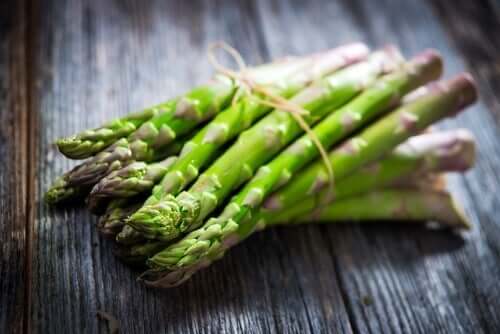Why Your Urine Smells after Eating Asparagus


Written and verified by the nutritionist Saúl Sánchez Arias
Some foods alter the smell of urine. Asparagus is one of them, meaning that it makes your urine smell after eating it. The origin of this phenomenon is a substance called asparagusic acid. Its metabolization leads to a waste product called methanethiol, which is responsible for the smell of urine.
Also, the metabolization of asparagusic acid generates other substances, such as dimethyl sulfide and sulfur compounds that cause the characteristic smell. However, this process doesn’t occur in everyone. It’s actually determined by the presence of a particular gene in the DNA.
Not everyone can perceive the smell
In the same way that a gene determines the production of these compounds after eating asparagus, not everyone can detect a stronger smell in the urine. In fact, only 40% of the population is sensitive to it.
The detection of the smell is also related to genetics and the type of DNA of each individual. However, a way to disguise the fact that urine smells after eating asparagus is drinking more water and eating diuretic foods. This way, the urine will be less concentrated and, therefore, less smelly.
Also, we should note that a high percentage of the people who aren’t able to identify this smell is female. Generally, women are better at identifying odors. However, this is the exception. This may also be because the position women urinate in makes it harder for them to perceive the smell. However, it’s necessary to continue studying this phenomenon and the importance of the genome to reach better conclusions.

Keep reading: 6 Reasons to Eat Asparagus and How to Cook It
Natural diuretics to reduce the urine smell after eating asparagus
Some foods increase urine production and stimulate urination. Good examples of these are pineapple and tea. These foods help fight fluid retention and have the ability to reduce the smell of urine by lowering its concentration. Also, they help detox the body because they increase urine production and thus clear the body of waste products.
However, it’s also necessary to ensure proper water intake to prevent dehydration. Generally, two liters of water (about 8 glasses) is usually more than enough to ensure proper hydration. However, in warmer and wetter climates, you may need to drink more water. The same applies in the case of athletes who lose a lot of fluids through sweat. Correct water intake, along with natural diuretic foods, help preserve kidney health.
Find out more here: Your Health and Urine – 8 Different Types
Other properties of asparagus
Asparagus is rich in minerals such as potassium. Also, it’s rich in vitamins C and B. Moreover, it’s a source of fiber, meaning it’s a filling food, apart from being low in calories.
We should also note that this vegetable is very versatile, meaning you can use it to make many different recipes. You can steam or sauté it. Likewise, you can make a cream of asparagus soup. Another great idea is to make a quiche with this vegetable. Also, it has a long shelf life.

Conclusion
Asparagus contains a substance that metabolizes in the body, leading to the emergence of sulfurous waste products. This is why urine smells after eating asparagus.
However, not everyone can perceive the smell.
Regardless, asparagus is a very interesting vegetable to include in your diet. It’s rich in fiber and doesn’t have a lot of calories, making it ideal for any type of dietary plan. Also, this vegetable is very versatile, meaning you can make many different recipes with it.
All cited sources were thoroughly reviewed by our team to ensure their quality, reliability, currency, and validity. The bibliography of this article was considered reliable and of academic or scientific accuracy.
- Ramamoorthy A., Sadler BM., Van Hasselt JGC., Elassaiss-Schaap J., Kasichayanula S., Edwards AY., Van der Graaf PH., Zhang L., Wagner JA., Crowdsourced asparagus urinary odor population kinetics. CPT Pharmacometrics Syst Pharmacol, 2018. 7 (1): 34-41.
- Mitchell SC., Waring RH., Land D., Thorpe WV., Odorous urine following asparagus ingestión in man. Experientia, 1987. 43 (4): 382-3.
This text is provided for informational purposes only and does not replace consultation with a professional. If in doubt, consult your specialist.








